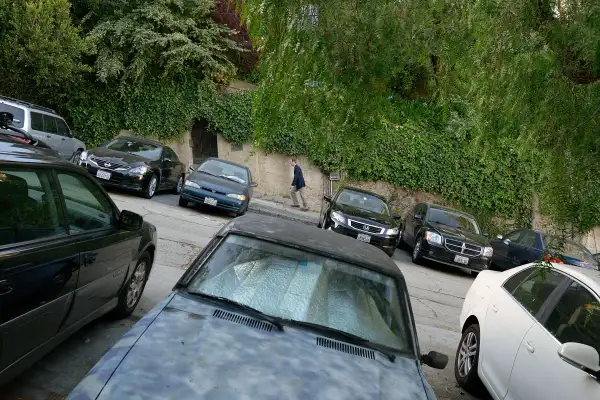Can We Stop Pretending the Sharing Economy Is All About Sharing?

The "sharing economy" is the all-purpose term used to describe transactions in which someone in possession of a car, or home, or self-storage space, or commercial real estate, or almost anything else imaginable "shares" it with a stranger. But is "sharing" the right word? Sharing is something people generally do out of the goodness of their hearts, and in pretty much all sharing economy scenarios, some money is changing hands. You don't come across too many listings at airbnb, the godfather of the sharing economy model, posted with a nightly rate of "share and share alike."
The other popular term for this world, "peer-to-peer" business, seems more accurate, though also more cold-hearted. The latest example of the "sharing economy" phrase seeming like a stretch comes in the form of an app that allows a user to auction off a public parking space for $5, or maybe $20, occupied by his car. If your initial reaction is that this is simply unregulated, tech-enabled, supply-and-demand entrepreneurial capitalism as opposed to "sharing," you're not alone.
"The rub is that your parking spot isn’t really yours. It’s the city’s," Wired wrote of the app, MonkeyParking, when it debuted in San Francisco in May. "Whereas services like Uber and Airbnb help us make use of things that would otherwise go unused — at least in theory — MonkeyParking merely lets one person grab something ahead of another. That strikes a lot of people as anti-social."
It also strikes many as quite the opposite of sharing. And the app strikes the San Francisco city attorney as illegal. A cease-and-desist letter was sent to the app's makers recently, and city attorney Dennis Herrera issued a statement accusing MonkeyParking of creating "a predatory private market for public parking spaces that San Franciscans will not tolerate."
That would seem to be the end of MonkeyParking, but the app's makers aren't giving up without a fight. On Thursday, MonkeyParking CEO Paolo Dobrowolny issued a statement refusing to shut down the app, not on the grounds that the cease-and-desist order constitutes an infringement on sharing but because it was “an open violation of free speech.”
“I have the right to tell people if I am about to leave a parking spot, and they have the right to pay me for such information,” Dobrowolny said, according to the San Francisco Chronicle. Another San Francisco-based parking space app, Parkmondo, which also received a warning from the city, also claims that it's simply information being sold, not publicly owned parking spaces. “The last time I checked there is no law in America that prohibits you from selling your information,” Parkmondo's Daniel Shifrin explained to the Wall Street Journal.
Not long ago, the Chronicle also posted a report poking holes in airbnb's "folksy" argument that the vast majority of its hosts are simply small-time "home sharers" who earn a few dollars here and there by occasionally renting out a spare room. This is a perception airbnb has presented by way of reports like one issued last summer concerning Paris, in which researchers released data points like this:
83% of Airbnb hosts rent the homes they live in to visitors on an occasional basis, and nearly half the income they make helps them to make ends meet by being spent on living expenses (rent/mortgage, utilities, and other bills).
The Chronicle report showed a different picture. After looking at 5,000 airbnb listings in the city, the paper determined that two-thirds of rentals were for entire homes or apartments—not spare rooms—and that roughly one-third of the "hosts" controlled multiple listings. The latter point indicates that these "hosts" seem a lot more like old-fashioned landlords than collaborative techie sharers.
Some of the "sharing economy" businesses are themselves being accused of using ruthless, old-fashioned money-making tactics. An Alternet post pointed out that in light of surge pricing, the lack of regulation, and labor exploitation, the ride-sharing company Uber has a lot in common with "old-school capitalist companies." In Seattle and Los Angeles, among other places, Uber drivers—those who directly benefit from sharing economy transactions—are battling it out to get more protection and rights as employees.
Drivers for Uber and its ride-share competitor, Lyft, have also been complaining that the pay is decreasing. This is especially hard for drivers to stomach when they read about Uber being worth $17 billion. Why can't such a valuable sharing economy business, you know, share the wealth, drivers are wondering.
While ride-share companies are being taken to task for exploiting drivers—who are independent contractors not employees, the companies claim—MonkeyParking is being accused of something worse: illegally using public property for profit, and making life even more difficult and unfair for the poor guy on the lookout for a free spot to park.
MonkeyParking sees the situation differently, of course. “It’s a fair business for anybody,” CEO Dobrowolny told the Chronicle. “It’s not just for rich people. If you think you can get that money back when you leave that parking spot, you can earn back the money when you leave the spot.”
That may very well strike you as fair. But it's not sharing.
